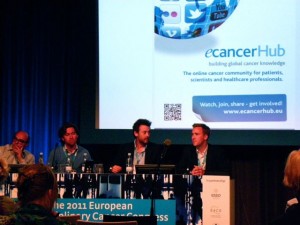EMCC 2011 Patient advocacy session on Cancer & the Internet
 The patient advocacy session on “Cancer and the Internet” at the 2011 European Multidisciplinary cancer congress (#EMCC2011) in Stockholm was well attended by patient advocates from across Europe, as well as industry and communications professionals.
The patient advocacy session on “Cancer and the Internet” at the 2011 European Multidisciplinary cancer congress (#EMCC2011) in Stockholm was well attended by patient advocates from across Europe, as well as industry and communications professionals.
The session focused on building online communities, how the internet can help patients with rare diseases have a voice with policy makers and showcased the new European cancer portal: ecancerHub.
Chaired by CML advocate, Jan Geissler (@jangeissler) the session heard from ACOR founder Gilles Frydman (@gfry), Denis Costello from Eurodis (@rarecare) and Richard Sullivan from Kings College London.
Earlier this year, the PEW Internet & American Life Project reported that 80% of internet users have looked for online health information around a disease or major health topic. The internet continues to grow in its importance to patients and how the pharmaceutical/biotechnology industry reaches them.
One of the challenges expressed in questions from the audience was the plethora of information available on the internet to patients, and how the number of available sites continues to grow, leading to overwhelm. Knowledge, as Gilles Frydman wryly observed, is always in beta.
ecancerHub is a new online global cancer community and knowledge portal
Superportals such as the ecancerHub are likely to play an increasing role in how patients share information and research the internet, especially if they can curate reliable, accurate and independent sources of information.
Funded by the European Commission’s eurocancercoms project, ecancerHub aims to become a leading knowledge base for cancer information and also where online communities of patients can easily meet to share experiences and learn from each other.
Other than a quick visit, I have not yet had the chance to check the site out fully, but it looks promising. I was particularly interested by the future developments that were discussed, such as focused search engines that will help people find clinical trial or cancer information.
Ultimately, ecancerHub will only succeed if it gains a critical mass of users and to do this, not only must it become widely known, but it also has to offer superior content, ease of use and an online experience that promotes patients to preferentially build enduring and valuable communities on it as a one stop hub, rather than elsewhere.
If you are a cancer patient or have an interest in healthcare social media, ecancerHub is worth a visit.
